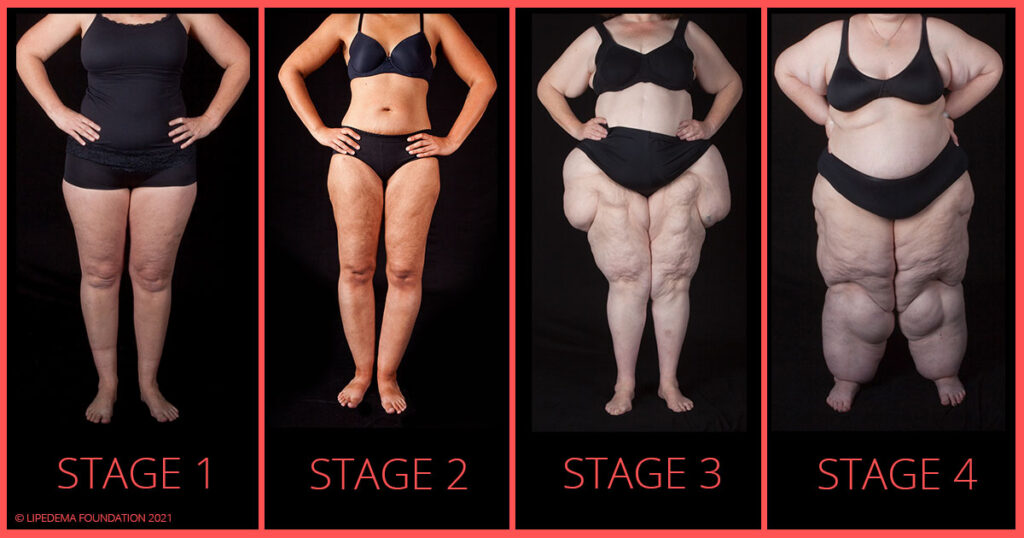
Lipedema is a medical condition that affects the distribution of fat in the body, causing abnormal accumulation of fat in the legs and buttocks. It is a genetic disorder that is more common in women, although it can affect men as well. Lipedema typically causes swelling in the lower extremities, and it can be accompanied by pain and difficulty moving.
It is estimated to affect around 11% of all women and can occur in women of any weight. While it is not necessarily related to being overweight, it can lead to an increase in weight due to excess fat accumulation.
Editor’s Suggestion:
Symptoms of lipedema may include swelling in the legs, hips, and buttocks; pain or discomfort in the affected areas; and difficulty moving or exercising. This condition may also cause changes in the skin, such as dimpling or thickening, and it may be accompanied by other conditions such as lymphedema or cellulitis.
Lipedema is not caused by unhealthy habits or lifestyle factors, and cannot be treated with traditional weight loss methods such as diet and exercise. In fact, exercise may help to prevent the development, but will not reverse the condition once it has occurred.
Currently, the main treatment for lipedema is invasive procedures such as liposuction, which can help to reduce excess fat deposits and improve the appearance of the affected areas. It is important for people with this disease to seek treatment from a qualified medical professional to determine the best course of action for their specific situation.
It is also important to raise awareness about this condition, as many people may be unaware that they have lipedema and may be seeking treatment for weight loss without understanding the underlying cause of their symptoms.

The cause of lipedema is not fully understood, but it is believed to be related to abnormalities in the lymphatic system, which is responsible for draining excess fluid from the body. Lipedema is not related to lifestyle or diet, and it cannot be prevented or cured through lifestyle changes.
There is no known cure for this disease, but treatment options may include massage, compression garments, and liposuction. It is important to consult with a healthcare provider for a proper diagnosis and treatment plan.
Lipedema can be a challenging condition to live with, and it can have a significant impact on a person’s physical and emotional well-being. It is important for individuals with lipedema to seek support and treatment to help manage the condition and improve their quality of life.
Celebrities who Might have Lipedema
Celebrities are often seen as perfection personified, with their flawless skin, perfect bodies, and glamorous lifestyles. However, it’s important to remember that celebrities are human too, and they are not immune to the imperfections and challenges that affect the rest of us. In fact, many celebrities have been open about their own struggles with imperfections, whether it be acne, scars, or other skin conditions.
One celebrity who has been open about her struggles with imperfections is Lady Gaga. In a series of Instagram posts, Gaga shared photos of her scars and encouraged her followers to embrace their own imperfections. She wrote, “Scars are sexy. Scars are beautiful. Scars are what make us who we are. Be proud of your scars. Embrace them. They are a part of you.”
These celebrities and others have shown that it’s okay to be imperfect and that it’s important to embrace and celebrate our unique qualities and flaws. By being open about their own struggles with imperfections, they have helped to normalize the idea that it’s okay to be imperfect, and have encouraged others to embrace their own imperfections as well.
Rebel Wilson

Nelly Furtado

Wendy Williams

Mya

Alicia Keys

Shaughna Phillips

Misha Barton

Maisie Smith

Amy Schumer

Kirstie Alley

List of Celebrities with Lipedema
- Rebel Wilson
- Nelly Furtado
- Wendy Williams
- Mya
- Alicia Keys
- Shaughna Phillips
- Misha Barton
- Maisie Smith
- Amy Schumer
- Kirstie Alley
Image source: Lipedema Foundation